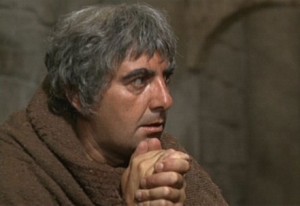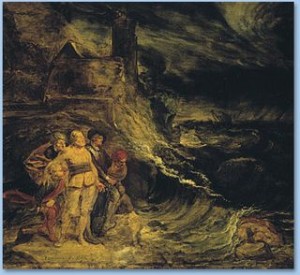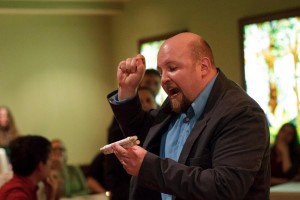I saw a production of Much Ado About Nothing today. In Act 4, after Hero has her wedding ruined by slander, the Friar suddenly concocts a cunning plan to rescue all. I was immediately reminded of Maria’s scheme in Twelfth Night: a party is ruined by Malvolio, and Maria hatches a plot to deceive Malvolio and (in the eyes of her friends and herself) set all to right. Much Ado’s Friar likewise hatches a plot to deceive Claudio and Don Pedro, who have ruined Hero’s wedding, and set all to right. This of course conjures Romeo & Juliet‘s Friar Lawrence, who hatches a plot to deceive Juliet’s household and set all to right.
The Clever Servant is a hold-over from Classical comedy, revived in Neo-Classical France, Commedia Dell’Arte, and modern reinventions of the same. Shakespeare has his share of helpful servants, but they are usually no more cunning than their masters (Tranio, Ariel, and the Puck for example). If a servant has any real wit at all, s/he is likely to be more mischievous than helpful (Maria, Feste, and again the Puck). Indeed, looking at Comedy of Errors, Coriolanus, and Two Gentlemen of Verona – just to name the more prominent among them – Shakespeare seems to have taken a rather dismal view of the Groundlings: stupid, greedy, short-sighted, mean-spirited, and eager to abuse the slightest power given to them. In my limited understanding and experience, I struggle to think of a Shakespearean servant who is intelligent, well-meaning, and helpful. Lear’s Fool is the only ready candidate (though he is ultimately ineffective): for that matter, Lear himself is one of very few that expresses some sympathy for the (invisible) lower classes after he joins their ranks:
“Poor naked wretches, whereso’er you are,
That bide the pelting of this pitiless storm,
How shall your houseless heads and unfed sides,
Your looped and windowed raggedness, defend you
From seasons such as these? Oh, I have ta’en
Too little care of this!”
By contrast, the Bard does usually seem to respect religion in his major and supporting characters; at least Christian religion, and at least on its face: Measure For Measure’s Isabella is a virtuous hero, Henry VI seems genuine and empathetic if a bit weak, and the Friars of R&J and Much Ado are wise and moral. By contrast, King John and MacBeth are punished for turning on their religion, and Shylock suffers a reversal ostensibly for nothing more than “because I am a Jew.”
So while Shakespeare’s servants seem incapable of virtuous mischief, who’s to say his Friars are equally hobbled? In fact, when someone hatches a long-winded scheme in a Shakespeare play, for good or bad, it’s almost always mischievous: Maria, Feste, and Sir Toby; Iago, Aaron, and Richard III; Petruchio, Oberon, and Falstaff. Although their clever deceptions take many forms, the invitation for japery is always present. Why not for the Friars as well?
I’m definitely not the first to say that Romeo & Juliet is a comedy until everyone starts dying. Now it’s true that Mercutio and Tybalt are dead when Friar Lawrence hatches his scheme to fake Juliet’s death, and the titular lovers have both threatened suicide themselves. But why play the ending? Why not fight for a comedy, for a happy end, even now? I saw a production of R&J in which a rather emo-y Romeo was chastened into ‘manliness’ by a stern and no-nonsense Friar, eliciting appreciative laughter from everyone in the audience above sixteen years of age. Why can’t Lawrence treat Juliet’s suicide-attempt in a similar fashion and try to add some levity to this heavy situation.
Along those same lines, the thing that has always bugged me about every production of Much Ado About Nothing – even good ones, like the one I just saw – is that Hero isn’t dead! We know she isn’t. Furthermore, we can arguably infer from Midsummer’s Helena, Henry VI’s Margaret, and perhaps even T&C’s Cressida, that chastity and fidelity are not necessarily such weighty issues (Claudio & Hero is a retelling of a much more ancient romance, but then so is Midsummer). Yet we are always meant to feel the great tragedy of her death and shame.
My favorite scene in Much Ado isn’t Dogberry or even the eavesdropping scenes: it’s Leonato’s and Antonio’s challenging of Don Pedro and Claudio. These two old men have the chance to completely lose control, to wail and oversell and freak out while threatening these two younger men. My favorite version of this scene to date was a recent Unrehearsed production, where Antonio’s fervor suddenly leads him on a huge rant, and Leonato’s attempts to calm his brother’s rage beautifully parody (or even mirror) Benedick’s similar attempts to calm Beatrice just minutes ago. The old men are even told by the (scheming) Friar to bewail Hero’s death, much as Hamlet plans to put an antic disposition on, or Sir Toby Belch plots to have Sir Andrew and Cesario terrify each other by their own cowardices.
These scenes, Beatrice’s and Antonio’s rants, can be very, very funny. Modern audiences just don’t empathize with slandered virginity, and indeed there’s some evidence that Jacobean audiences didn’t either. In Much Ado itself, the hypocrisy of court life seems plainly laid out by none other than Leonato: he rejoices to learn that no one “of name” has died in Don Pedro’s wars. Likewise, he tells us that if Hero has indeed had sex before marriage, his hands will tear her; BUT, if she has been wrongly slandered by three powerful men, said men will receive nothing but a stern talking to. Leonato is an over-reactor and something of a tyrant: his “Grieved I, I had but one?” directly parallels Lord Capulet’s from R&J. Now I admit, Shakespeare does write himself a complex character or two, but Leonato doesn’t have to transform from a jerk to a sympathetic character; most especially, a director doesn’t have to force that on us. Leonato can just as easily take his sincere overreactions and barter those into some hilarity later on. It’s especially great to see Antonio, who has been little more than an observer for much of the play, suddenly explode into a righteously indignant braggadocio. Happily, I saw some of this in today’s production, though I would have liked to see more: aided by the fact that these old men know the young men won’t fight them, and aided by the fact that they’ve been ordered to perform.
I guess all I’m saying is I wish the Friars weren’t so ding-dong serious all the time. I wanna see a clever Friar, a Friar who’s proud of his scheme. I wanna see a Friar who says, “I have a cunning plan!”
Addendum: I feel remiss that I didn’t mention the Duke from Measure for Measure, who disguises himself as a holy friar in order to spy on his servant Angelo. Although this is not as overtly mischievous as the proper friars, he does enjoy his unique knowledge of his own identity, and it of course leads to some hilarious interactions with everyone, especially Lucio.







